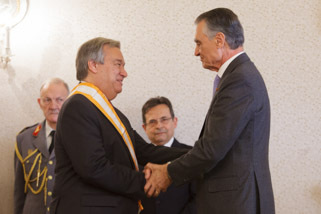
Manuel de Oliveira Gomes da Costa
Born in Lisbon on 14 January 1863 and died on 17 December 1929.
Cavalry officer. His father had been a subaltern officer of modest farming stock. He then took for himself the words of one of Napoleon’s marshals: “I am the ancestor!” A typical colonial soldier of the occupation campaigns marked by the figure of Mouzinho de Albuquerque. Until 1915 he remained almost without a break in India and Africa: Mozambique, Angola, São Tomé. It was there that he gained the prestige that the I Republic exploited by appointing him Commandant of the 1st Division of the Portuguese Expeditionary Corps. The campaign in Flanders did not hamper but rather strengthened that prestige. As with most African campaigners he had little or no sympathy for republicanism and – in what was typical imprudence – made no secret of the fact that he believed that if he had led the government forces the result of 4-5 October 1910 would have been quite different. Also typical was the fact that he did not resign with the implantation of the Republic which in turn had to contend with these prestigious officers. Even in the 20s, due it seems to financial problems, but also to political and temperamental reasons, he got involved in conspiracies. The Government opted to send him overseas as a military inspector (1922-1924). On his return he joined the Radical Republican Party under Cunha Leal, which was right-wing opposition to the Portuguese Republican Party-Democratic Party.
Invited at the last minute by Sinel de Cordes to head the coup being prepared, he was successful, in extremis, on 28 May 1926, when already considering flight and exile. He marched from Braga to Lisbon where he made a triumphant entrance on horseback at the front of the rebellious forces (6.6.1926). He removed Mendes Cabeçadas, taking over the presidency of the Ministry from him and in ways as yet unclear, the Presidency of the Republic as well. His sojourn in both positions (17.6 to 9.7.1926) was hardly less transitory than that of his predecessor. He was removed by Carmona and Sinel de Cordes, given his inability to manage the delicate balances of the new situation: having dismissed Carmona and other ministers (7.7.1926) and when pressed by various military units, having refused to resign, he was deposed. His prestige, however, was intact. He was therefore asked merely to step down from head of government but to remain as President of the Republic, which he refused. He was arrested and deported to the Azores (11.7.1926) to avoid movements of discontent growing round him. Even then, Carmona made him a marshal, a frequent occurrence among former military presidents. He was allowed to return (September 1927) when the situation had become sufficiently stable, and to prevent him dying a martyr in the Azores. According to Salazar, they had many talks during 1928. He died a poor and disillusioned man.
© 2006-2016 Presidency of the Portuguese Republic
You have gained access to the records of the Official Site of the Presidency of the Republic from 9 March 2006 to 9 March 2016.
The contents available here were entered in the site during the 10 year period covering the two mandates of President of the Republic Aníbal Cavaco Silva.